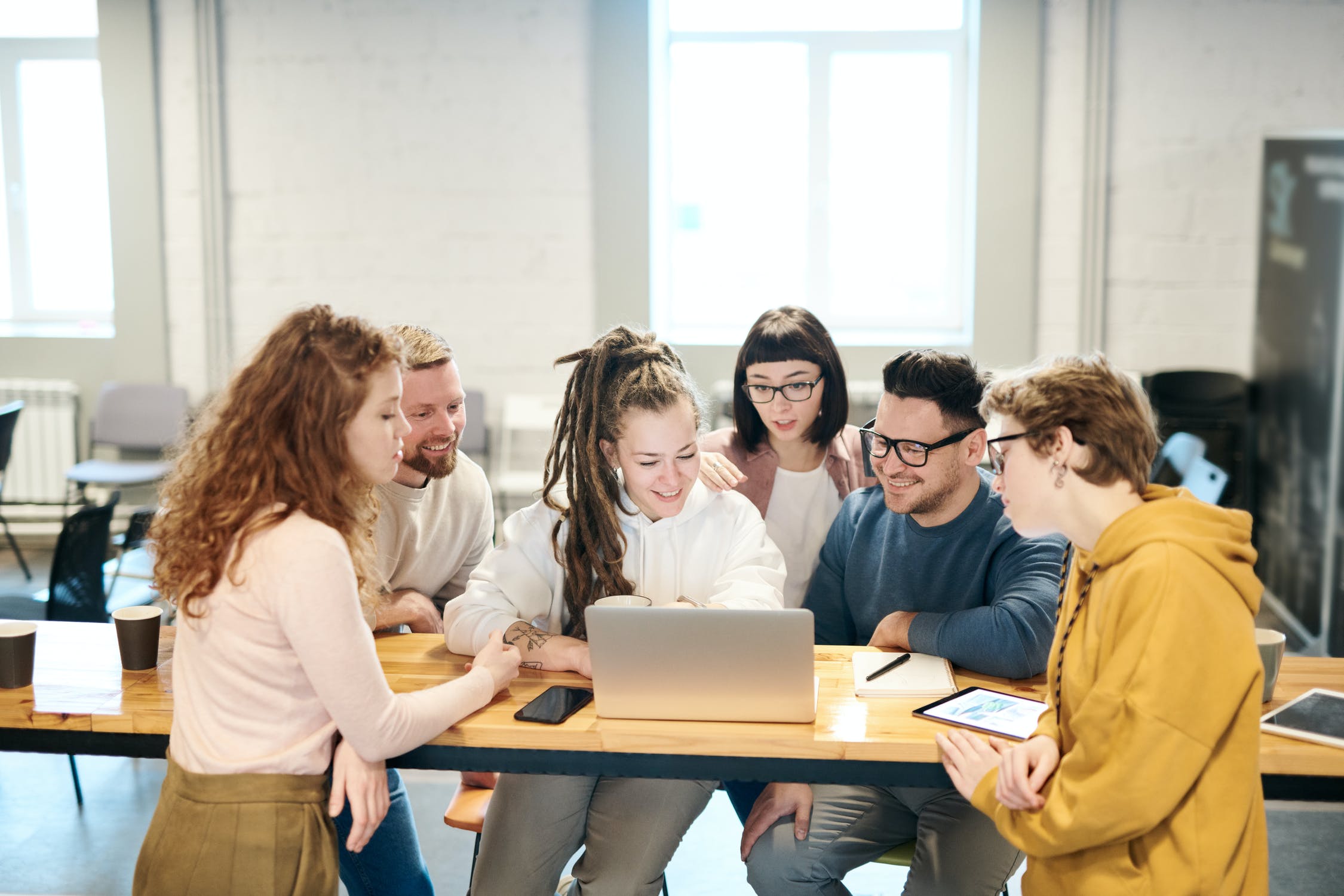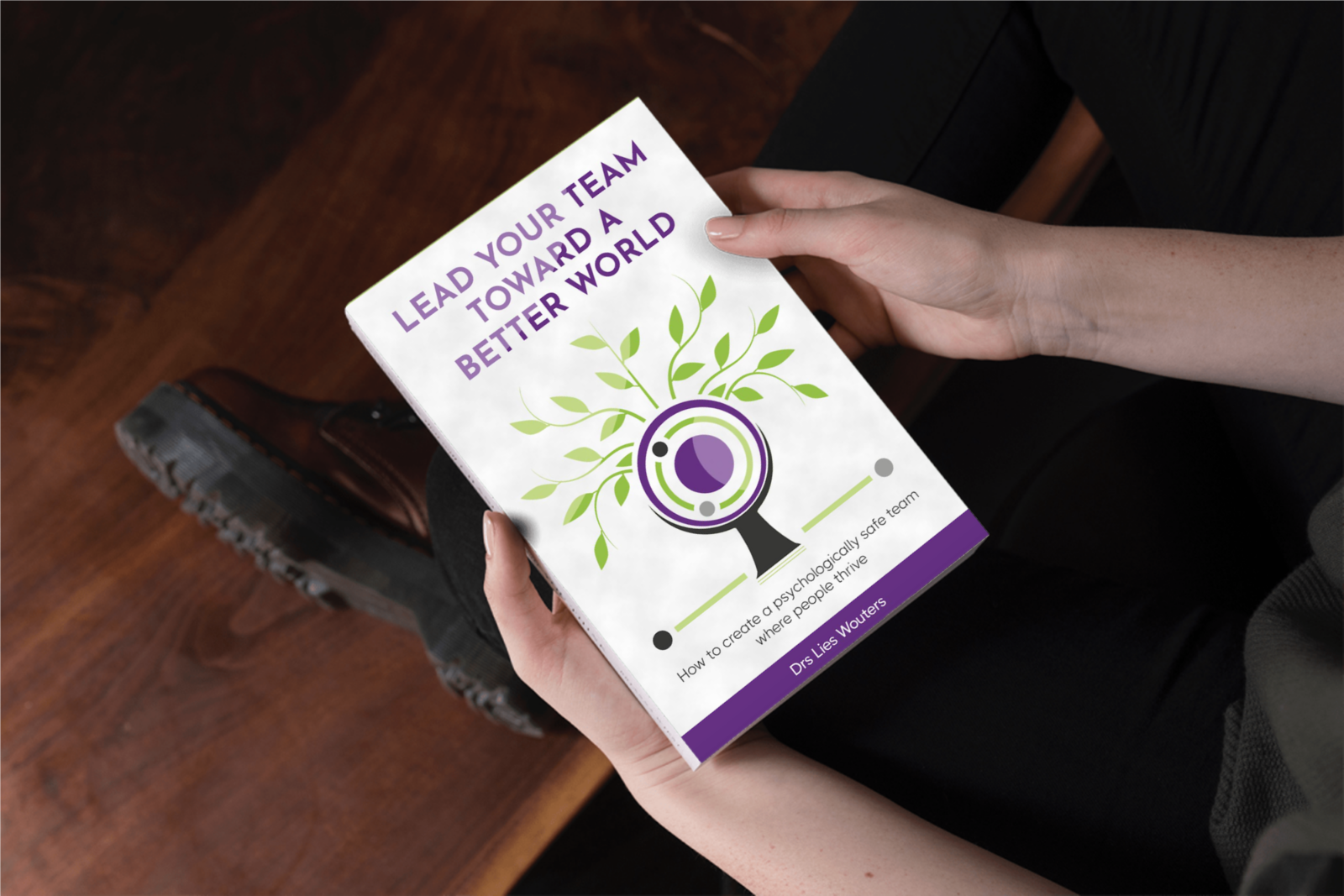Comments
- No comments found

In the knowledge economy we live in today, people have become more reliant on human capital and skills.
We have found out in the last decades that, when it comes to human capital, it is not as simple as working with machines. You can’t press the ‘on’ button and expect people to start being creative. If you ever tried writing poetry or tried painting or sculpturing, you may have experienced that your creativity can not always be unleashed no matter where or when. Sometimes it seems to ‘flow’ as if it is infinite and at other times it seems impossible to access.
However, for companies to thrive, that is exactly what they need: employees that can be creative and innovative. So how can we make sure that our company can access that creativity? And how do Covid times influence this process?
I sat down with Drs Lies Wouters, an international organizational psychologist, advisor, trainer and team coach, based in the Netherlands to learn more about psychological safety and how companies can implement this in their work environment.

According to theory, that ‘on’ button that switches on your creativity is called psychological safety. When your brain scans your environment and decides you are safe, it switches on the buttons in your prefrontal cortex (located in the front part of your brain) and your creativity increases, your memory increases, you feel more connected to the people around you and it positively impacts your overall performance. With that in mind, it is no surprise that the research into psychological safety has increased exponentially over the last twenty years.
Amy Edmondson, professor at Harvard University was one of the first scientists to study the concept within teams in organisations. She describes psychological safety as: “a shared belief that the team is safer for interpersonal risk-taking” (Edmondson, 1999). From this definition, you see that Edmondson approaches the term on a group level as she states that the belief must be shared by the members of the team.
These Covid times didn't only have as consequence that many leaders had to lead across distance, it also meant a lot of concern, anxiety and chaos in peoples’ lives. The obvious part is people being worried for their own health, or the health of their loved ones. On top of that, there is the effect of having less social contact. Over the last year you have seen the world change as the governments changed measures every couple of weeks, as the seasons changed, and as the minds of the people changed. The anxiety is not only caused by sickness and the amount of people dying but also from seeing your sense of freedom be compromised and even people being more aggressive than before. Many things that you used to do on automatic pilot, you have had to learn new behaviour. The impact on leaders in organisations has also been big as observed by Lies:
Leaders have a big impact on the sense of safety within the team and in the past two years, we have heard from many of them that they feel like they miss the connection with their team. They still talk to them. They still have their team meetings. But I miss the chat at the coffee machine, not seeing the people at their desk as you walk by, or even not overhearing some small talk between the colleagues, the leaders feel that it is much harder to have a good idea of how people are doing and what is happening in their lives. Finding out how people are doing is an important aspect of creating that safe space and the distance makes it much harder for a leader to do that.
It is not only harder for them to know how the people are doing, they also feel less confident about their leadership skills because the skills they have come to rely on now don’t always work in the online or hybrid environment. They get less feedback (verbal or nonverbal) from their team on these skills. At the same time, they themselves often struggle with working from their home office. In many parts of the world, schools were closed and children were being home-schooled, which often had a big impact on the energy level of the parents. In this day and age, many families have two working parents so there was no partner that could simply take the time to look after the children full-time. So this also had an impact on the leader’s ability to focus and the amount of stress they had to deal with. Knowing how you are doing yourself and being able to support yourself is an important foundation for building a psychologically safe environment. When you experience less confidence, less ability to focus and an increased level of stress, that makes it much harder to do so.
Both team leaders and team members struggled with being away from family and/or friends. Many of them had loved ones with health issues or mental health issues that they worried about. Now that there are possibilities for people to meet again, many have trouble getting used to this. To find a new way of dealing with having many people around you and to deal with a full social agenda again takes another toll. Depending on personality, the company culture and cultural background, people may feel more or less open to share any of these concerns. When you have many more people in your team that struggle, it becomes much more demanding to create that openness and it might take much more time to create that psychologically safe environment.

So how do you deal with this impact that these Covid times have on that sense of safety in your team? Luckily, whenever you face challenges, there are always growth opportunities. That does not make the situation less difficult. It only offers you ways to develop and grow as a team. So let’s have a look at how you can take this opportunity and what can you do in these Covid times to grow and nurture your team?
The (self) support system is a foundation to create a sense of safety. Previous research showed that it leads people to acknowledge their role in negative events without feeling overwhelmed with negative emotions (Leary et al. 2007). When you apply the self-support system, you first recognize how you feel, then remind yourself of your common humanity and as step 3 you offer yourself some friendly words (Neff & Germer, 2012). When you remind yourself of your common humanity, it means you realize that suffering, pain and difficult situations are part of being human. You are not alone in this. Every single human being experiences sadness, pain and difficult situations at some point in their lives. When you remind yourself that you are not alone in this, you activate your social engagement system which produces hormones in your brain that help you feel better. When you look at the impact of these Covid times, you see that it is large and wide and the whole world is affected by it. Whether by the virus itself or by the measures that governments apply to deal with the situation, you are all affected by it in some way. Feeling a sense of common humanity has never been easier. Once you are aware of the impact this has on you, whether directly on your health, on you missing loved ones, or struggling with three kids being home-schooled, it is easy to imagine that you are not alone. We are all in it together. Some people have been hit harder than others, but you are definitely not alone in this. Reminding yourself and each other in your organisation that you are in this together, can have a positive impact on your sense of psychological safety.
The impact of Covid on the world is chaotic, to say the least. Many people I speak to find that one day they feel like they can manage perfectly and the next day they wonder how they will get through it. For many people, it has been like a big roller coaster and you have no idea which turns or loops are ahead of you or even how long the ride will last. Sometimes you get the idea that you are near the end to find out that it is speeding up again for another round. This whole situation leaves you the possibility to practice your coping skills. And developing coping skills has a positive effect on your self-confidence. One way to develop those coping skills is to reflect on what happens to you when you get stuck in one of those roller coaster loops and what you do that worked well and what did not. When you start practising this on a regular basis, you come to discover the resources you have to deal with difficult situations and you build the confidence that you will be able to bounce back. Creating psychological safety within your team will be much easier when you know that when you and your team end up in a difficult situation, you will be able to handle it and you have the skills to support yourself.
I have heard from many people within teams that they feel very comfortable in their team. In fact, they feel so comfortable that they don’t want to stir that pot and that is exactly what holds them back from sharing a different opinion or admitting they made a mistake. With everything going on in the world, in your organisation and in your personal lives, the pot is now already stirred. Which makes it a perfect opportunity to build the confidence of the team that they can handle it and experiment how you can support each other through this process so it does not only become a terrible experience, but you also grow closer together. Have you ever had a big fight with a friend and have the feeling afterwards that your friendship grew stronger because of it? Depending on how you deal with the situation, hardship can help you grow closer and it builds your confidence that it is ok to stir that pot. If you take time now, while the pot is stirred, to share the things you find difficult, can express to each other what you need from yourself and others and be supportive towards yourself and others, you build that experience that the team in fact is safe for interpersonal risk- taking.
Even though these times offer you a unique opportunity to build psychological safety within your team, I don’t want to say that it makes these times any easier. Making the best of a situation does not mean ignoring the bad stuff. It means sharing the bad stuff, realizing that it is part of being a human being and offering kindness in the midst of it.
Lies is the founder of her own international business, OMG! which stands for tailor-made leadership and specializes in providing leadership training and coaching. Reach out to her for the psychological safety needs of your company.

Parul Agrawal is an International Bestselling Author, Speaker, Forbes Coaches Council Member and Podcast Host. She holds a double Master’s in Engineering from Arizona State University (ASU); worked as a Research Scientist at ASU and Engineer for Intel Corporation. In an effort to help others address major medical issues and live more healthily, she pursued holistic studies and acquired her certification as a wellness expert. After launching a successful Wellness Coaching business, Parul delivered the message of health through public speaking in various community centers and corporations. Parul’s life and business changed dramatically after she wrote a book on the benefits of juicing that became an International Bestseller in multiple categories. The book’s phenomenal success resulted in her being featured in major publications like the Huffington Post, Thrive Global, Forbes and as a guest on ABC Arizona. Parul has not only continued her success as an author and businesswoman, but she has paid-it-forward, by helping over 100 writers become bestselling authors, too! She is the founder of an International Publishing Platform where she helps thought leaders in the areas of health, wellness and consciousness write their books, achieve bestseller authority status, and land in mainstream media - just like she did! Parul is currently experiencing the honor of being listed as one of the 30 change-makers in India for the year 2018.
Leave your comments
Post comment as a guest